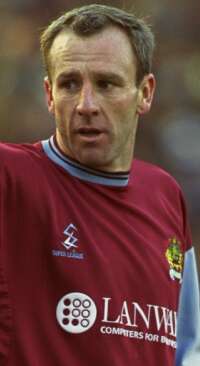|
Glen is the type of player – in the context of our club in recent times at any rate – who will inevitably be loved by the fans. He is a player of wonderful skill, who can light up any game with a flash of genius. Privately, most football fans can imagine themselves doing the job many players perform on the pitch, but players like Glen are different. They do things with a football that even the most self-indulgent fan cannot imagine doing.
It helps, in Glen’s case, that he was seen as the key factor in Burnley’s rising fortunes. The reason that it is he, rather than the equally talented Robbie Blake, who is worshipped at Burnley is largely because he is identified with the late resurgence which saved the club from relegation under Chris Waddle, with the promotion of 2000, and with the push to the top of the league two years ago. Blake has not played in a Burnley team that has achieved such success, save perhaps a couple of cup results last year.
The two biggest crowd heroes of the recent past at Burnley are Glen and Andy Payton. Payton was revered for two reasons: because he scored a hatful of goals which were identified with the revival of the club under Stan, and also because he was a claret. Fans always reserve a special place for players who are one of them.
Gareth Taylor became a crowd favourite because, last season, he scored goals. Moreover, he scored goals in games when the rest of the team were not exactly winning plaudits. He also won praise for his effort, and for his commitment to the claret and blue cause.
Yet Taylor’s turnabout was truly astonishing. When the clarets stormed to the top of the league in the autumn of 2001, Taylor was one of the least popular players in he team. People argued, rightly, that he was short of pace. They said he was one-dimensional and that his first touch was lacking. Some people suggested, wrongly, that he could be lazy. Many people dismissed him as a donkey, particularly when David Johnson arrived in town.
Barely six months later, he had turned his reputation around. Instead of being abused for his faults, they were smiled upon indulgently. His first touch had improved, he had gained a bit of confidence, but he was still, essentially, the same player. Instead of being criticised for tempting the clarets to play the long ball too often, he became acknowledged as an indispensable cog in the team. Instead of baying for him to leave, people were hostile to the prospect of selling him. The slow target man who couldn’t use his feet became a bustling, committed striker around whom the team should be built.
Rarely, if ever, does a player’s popular standing reflect his ability or impact on the park. Glen Little has often been over hyped, his faults (a lack of pace, an insistence on having the ball to feet, occasionally being over intricate, failing to track back) being overlooked in order to elevate him to a level beyond his station. Similarly, Tony Grant has never quite been as bad as the abuse he receives would suggest.
|
Fans want to see blood and guts, and they want to see passion. But the players who make a career out of doing that can be deficient in the fundamentals of the game, and the fans can turn against them when their errors became too much. That can make the difference between someone having a successful career with a club, and not quite making it. First impressions can be critical; football fans can be quick to judge and slow to correct.
Perhaps the players who lose out the most are the players who do not put in bone-crunching tackles, or wear their heart on their sleeve, or catch the eye because of their ability. It is the players who go quietly about their work; the unsung heroes of the team. The Ian Moore’s, the Paul Weller’s, the Lee Briscoe’s of this world. Their value to the team is not necessarily obvious immediately – indeed, the times when they are most visible can be when they give the ball away, or miss a tackle. It may only be a one in a hundred event, but it is what sticks in the mind.
At the end of the day, all of this is the reason that we do not manage the team. Stan Ternent probably has a more realistic view of the players we watch than any of us. He sees them every day, watches them intently before he signs them, and gets paid to accurately gauge their value to Burnley Football Club. We sit in the stands and make our own judgements. And we get it wrong a lot more often than Stan does.


